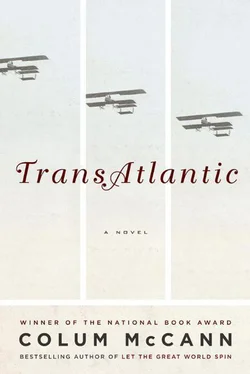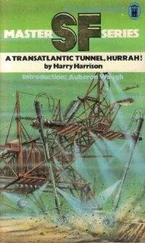She turned her face into his chest once more. He was not sure what to do with the manner in which she wept. She curled against him then, and fell into a hard, deep, exhausted sleep.
The painting was put on the mantel above the fireplace. At times she thought she could see Isabel Jennings striding along the riverbank, the long elegant swish of her dress. There was Richard Webb standing on the arched bridge, looking down at the fast water, the splash of current, in all his earnest frustration. There were days, too, when she let her mind drift towards Frederick Douglass: he did not enter the painting much, but hovered outside it, waiting to stride in, perhaps from the distant hill or the road behind the cottage. The recollection of him lifting his barbells in his room startled her. His face in the rain on the day she left. The pale of his palms. She remembered the disappearance of his carriage down Great Brunswick Street and, upstairs, the casual way his towel had been left draped over his washbasin. Hunched over his writing desk in his shirts of billowy white.
She had heard that Douglass was aligned now with the party of the late Abraham Lincoln. Making speeches for the proper suffrage for the Negroes. He was a man much admired but reviled, too. They had achieved freedom but at what cost? In Ireland she had thought of him as a gentleman, tall, piercing, commanding, but here he was more of a confusion. It was not that she had anything against the Negroes. Why should she? There was no call for it. They were men and women, too. They starved, they fought, they died, they planted, they reaped, they sowed. Yet there was such an upstirring about them, too. Lily had heard there’d been riots from the Irish in New York. Men strung from lampposts. Children burned in an orphanage. Savage beatings on the streets. Nothing was simple. So many possibilities. The years had shaded her. Lily’s own son had fought for the Union. He had died on the battlefield for the very words that Douglass had spoken of in Ireland all those years ago. And yet Thaddeus had never even once mentioned slavery or darkies or freedom. He had just wanted to fight. That was all. The glorious vanity of dying.
There were times when she went south to St. Louis, or north all the way to Des Moines, that she saw Negroes on the streets and she felt a dislike moving through her. She stopped herself. Tried to catch her own falling. Still, it was there, distant and hazy.
In church she lowered her head and prayed for forgiveness. Old prayers. Remembered incantations. She opened the Bible in front of her. She thought that she should learn how to read, but there was a purity in the silence. She tried to recall the words of Douglass in the drawing room on Great Brunswick Street, but instead, her mind drifted towards those men for whom she had pulled the curtain across: the warmth of blue beneath their eyelids as their flesh moved towards gray.
SHE WATCHED EMILY lean into her father, listening. Seven years old, following the rough of his finger across the page. The Book of Job. Revelation. The Book of Daniel. The sight gladdened her. The space by Emily’s bed was beginning to fill with books from school. Still, it was odd to watch a child so very different from herself, her own flesh and blood.
Often Lily found the young girl asleep with her long hair inserted in the pages, a sort of bookmark.
A SHOUT ECHOED outside. Lily thought nothing of it. She moved from the smokehouse back to the kitchen. She unscrewed a jar of cornmeal, sprinkled some on the wooden counter, leaned against the stove. The warmth rolled from it. She closed one of the stove doors with her knee. She reached for a jar of buttermilk. Another shout cracked the air.
The shouts had come from down near the storage sheds. She paused. Another series of dull thuds, then a silence. She walked towards the window. The sky a very pale blue. Another sound, hollow and continuous, a groan, a slow surrender. Adam’s voice sounding over the snow.
Lily ran out. The cold stung her. The snow kicked up at her feet. No shouts came from the sheds anymore. Just a raw quiet.
Past the stables and the toboggan shed. Calling their names as she went. At the sheds she could see shards of sawdust caught on the air. She rounded the corner. The planks had splintered. Nails had popped out from the boards. A large iron hinge lay on the ground. A single ice fork was still stuck in the snow bank. A tangle of pulleys lay forlorn on the ground.
A small run of blood ran between the cakes of fallen ice and the wooden wall. She went to Benjamin first, then to Adam, across once more to Benjamin. The small of the boy entirely crushed by a single cake. She pushed the weight off his chest, put her cheek to his lips. No breath at all. She wiped the sawdust from his eyebrows. She did the same with Adam. She did not cry out. She could hear the other cakes of ice still moving and slipping above her, but quietly now, as if in reverence. She inched across the fallen planks of wood, and bent over her husband.
Jon Ehrlich attempted a nod, but a bubble of blood rose up at his mouth. She pushed the shattered cube off his legs. Don’t you go. Don’t you dare. He moved his head slightly. His eyes fluttered. Don’t you die on me.
She was sure she saw him nod and then she heard the rattle of his throat. Lily could feel the fall of his life away from him, some manner of relief, a melting away. She rose from her knees and put her hands to her head and let out a high keen.
The storage shed still stood, three-walled. The remaining walls yawed and groaned. The lake within the ice. The water eager for movement. She stepped across the shattered planks and leaned down to Benjamin once more.
She put her arms under the shoulders of her youngest son and tried to yank the dead boy out from under the collapse. His boot caught on a piece of beam. She could feel the boot rip as she yanked him from under the rubble. She tugged again. The ice moved.
Some laughter rolled from him. She bent down towards him. Some laughter again. Oh. Benjamin. Oh. She grabbed the back of his head but it lolled. She shook him. Get up, get up, you’re alive. His eyes were huge and surprised and unmoving. She rose into a crouch, pawed her way across the hard ground. Reached for Adam. She put her face against his lips. No breath. No warmth. More laughter, she was sure of it. But from where, whom? She heard it again, this time from its proper distance. Her chest heaved. From the house. The other children emerging from the cabin. The high play of their voices. Lily rose and rounded the corner of the sheds. She brandished an ice fork. Go back to the house, she said. Put wood on the fire, Nathaniel. Clean up the cornmeal, girl. Don’t come out again. I’ll be right home with you. I’ll be right back. You hear me? Tomas? Lawrence? Now, I said. Sweet Jesus. Now. Please.
Emily stared at her. Rooted to the ground.
— Go, shouted Lily. Go!
She went back to the work of dragging the bodies from underneath the ruin. The three walls remained. They moved minutely, threatening collapse.
SHE LAID THE bodies out side by side on the ground, her husband and two sons, then went back towards the house. She needed cloths to cover their eyes. Lily pushed open the cabin door. The boys were cowering in the pantry. Emily was at the window, looking out. Lily called her daughter’s name. No reply. She called it again. Emily, she said. No movement at all. She stepped across and turned the girl from the window. The child’s eyes were remote, vacant.
Lily slapped her daughter hard across the face, told her to get herself dressed, there was work to do. The child did not move, but then she rose and put her forehead against Lily’s collarbone. Mother, said Emily.
TWO EVENINGS LATER Lily Ehrlich hired a carpenter to come out and restack the cakes and fix the wooden shed. The weather was mean. The wind blew bitter. The hammering went all the way through the night.
Читать дальше












